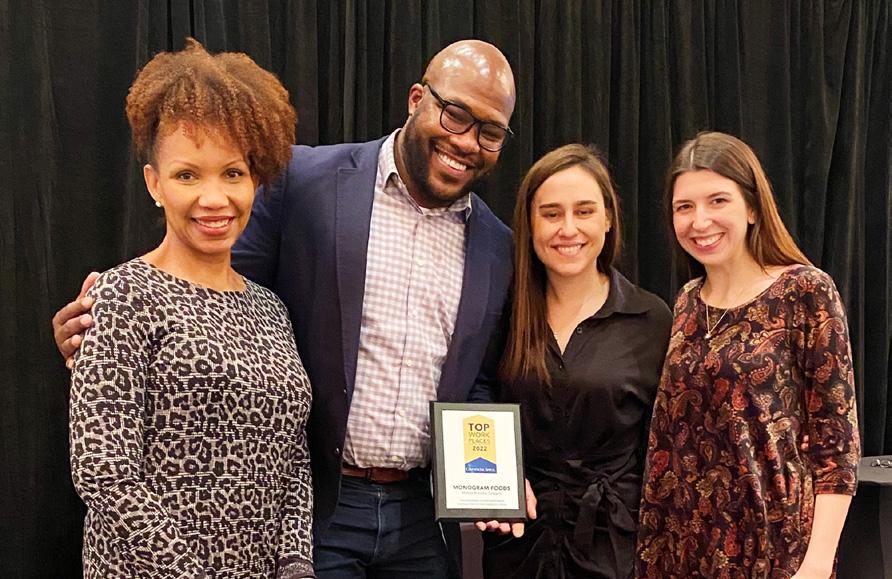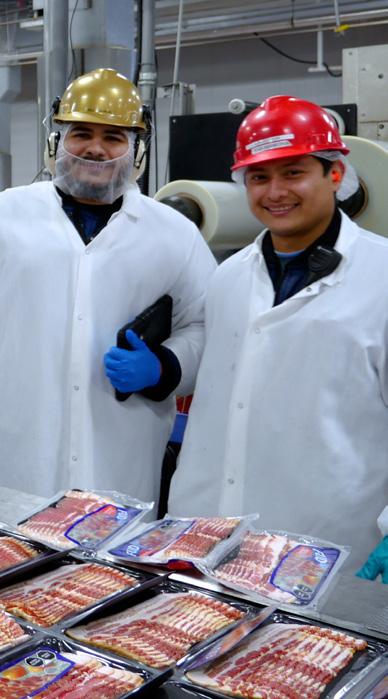

20th Anniversary
HISTORY DIVERSITY PEOPLE POWER FUTURE







20th Anniversary
HISTORY DIVERSITY PEOPLE POWER FUTURE




INTRODUCTION pg. 3
HISTORY pg. 4
FACILITIES pg. 16
PARTNERS pg. 19
FOUNDATION pg. 23
BRANDS pg. 27
PEOPLE POWER pg. 29
DIVERSITY pg. 33
FUTURE pg. 36









We’re thrilled to celebrate 20 years of excellence with Monogram Foods! For two decades, Monogram Foods has been a trusted partner in delivering quality and innovation in food solutions. Thank you for allowing us to be a part of the journey.
Here’s to many more years of partnership and success!
SOLUTIONS THAT SCALE. RELATIONSHIPS THAT LAST.
Distribution | Transportation | MHE | Fulfillment
Karl Schledwitz CEO and Co-Founder
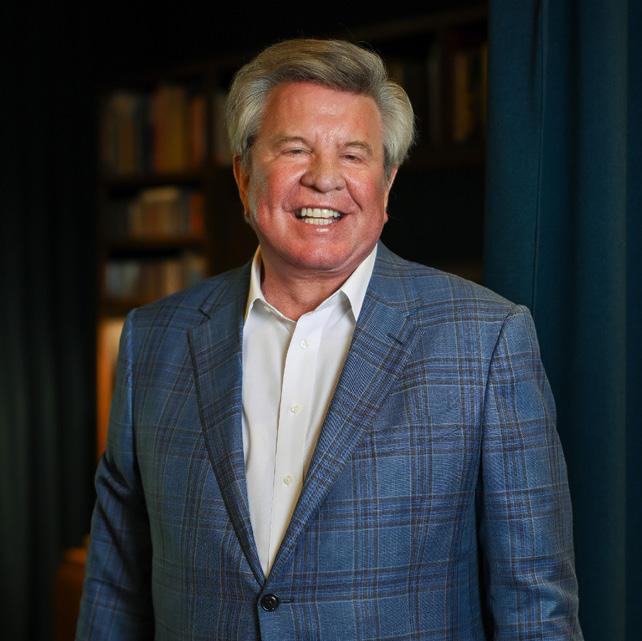
Monogram Foods turns 20 in 2024, and while you may not have heard of this company which had $1.4 billion in revenue in 2023, chances are you’ve consumed a product made by the Memphis-based operation. “We make food for the top grocery chains and retailers in the country,” says CEO and Co-Founder Karl Schledwitz.
Monogram is a co-manufacturing partner and private-label provider for strategic partners across the United States. That means that most of the
products they make are not sold under their own name. Instead they partner with big-name brands to make their visions a reality. “We are not a branded company,” says Schledwitz. “About 94 percent of our business is making other people’s products. We have a few regional brands like King's Rightly Seasoned, Circle B, and Wild Bill's, but collectively it's six percent of our business.”
While they don’t name customers and partners, Monogram-made products include meat snacks (jerky and sticks), appetizers, raw and cooked bacon,
sandwiches, and corn dogs.
The company is also known for giving back. The Monogram Foods Loves Kids Foundation has raised $17 million for children’s charities across its footprint, and gives grants to organizations in all of its locations each year.
And while Monogram’s roots are planted firmly in Memphis, its people and manufacturing facilities span the U.S. with 13 locations across seven states. “Our people are what have sustained us for 20 years,” says Schledwitz. “And they are why I believe in the next 20, and beyond.” �
Karl Schledwitz and Wes Jackson founded Monogram Foods 20 years ago and they are the perfect guides to the company’s lively and colorful timeline, one that literally covers yards of wall space in the company’s main office in Memphis. You might call it the headquarters, but Schledwitz would rather you didn’t: “We’re here to support the hardworking team members in the communities and our suppliers and our customers, so this is the Monogram Support Center.”
So, there in the heart of the Support Center, Schledwitz, now the company’s Chairman and CEO, takes us on a tour of the company’s living timeline, pointing to image after image of people, places, and events that have shaped Monogram over the last two decades, telling the story behind each image. He stops at a large, lit-up plaque that displays the company’s Mission, Vision, and Values. The same image hangs in all 13 Monogram locations across seven states. At

the center it says the company is the “Growth Partner that Makes it Better.”
“This vision guides all that we do,” Schledwitz says. “Grow our team, grow our customers, grow profits together,” he says. “Continuous profitable growth.”
The growth began in 2004, when Schledwitz was making the rounds to raise money for his budding enterprise. One of the people he met during this
time was Jackson who was president of Sara Lee Corporation’s Dinner Group in Cincinnati and overseeing sales of more than $1 billion. As Jackson put it, “Karl is quite a gregarious and convincing gentleman, and we hit it off.” In fact, they came up with an idea, and put together a pitch to Sara Lee to sell some of its properties to the new company. And it was more than an acquisition.


Acquired King Cotton (King’s Rightly Seasoned), Circle B, Dollar General Refrigerated Program and Sara Lee Hams


2006 Opened Monogram Foods Plant in Chandler, MN
Wes and Ches Jackson

Jackson says, “It seemed like an opportunity to kind of scratch my entrepreneurial itch. I challenged Karl that if we would raise funds to buy King Cotton— now called King’s Rightly Seasoned — and Circle B from Sara Lee, that I would join forces with him and move back to Memphis and help start this company. And Karl, being the serial entrepreneur he is, said, ‘Let's make it happen.’”
The local popularity of the brands was a big bonus. “So many people brought us paraphernalia because King Cotton had been here forever,” Schledwitz says. Nat Buring, who would go on to be a philanthropist and owner of the Memphis Chicks pro baseball team, started King Cotton in the mid-1930s, so the fondly remembered brand continues to have a lot of memories for Mid-South-
2007
First Year Of Profit
erners. Beloved Memphis sports legend Penny Hardaway has long been associated with the brand, as a spokesperson and supporter.
For Jackson, the jump to Monogram was welcome, but it took some getting used to. “It's been a fun ride and a blessing to start something and see it grow. But I had worked with a big corporation my entire career, and I was running a $1 billion division for Sara Lee. Then to go back to have seven employees and about $8 million of revenue — there were a lot of challenges for sure.”
But those challenges were accepted and met. “We were able to continue to grow and put things together. I would say we were probably four years into it before I quit worrying about whether or not we were going to make it, because most startups in America don't make it. But to see us go from $8 million to $1.4 billion in 13 manufacturing facilities and
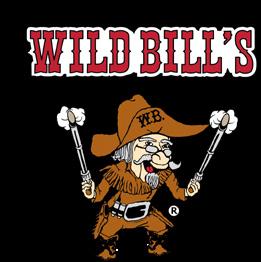

2007
Began manufacturing Circle B in Chandler, MN facility
Continued
4,000 employees has been far more rewarding than I could have imagined.”
Jackson has a twin brother who came on board around 2006. “Ches Jackson came to do the back of the office, so to speak, the operations,” Schledwitz says, “and Wes was doing the sales and marketing — the front — and I was overseeing everything and trying to raise the money and the financing.”
The Jackson brothers were a team with a fitting background. The identical twins grew up in Obion County and attended the University of Tennessee at Martin. Their dad, Billy Joe, was an hourly worker at the Reelfoot Meat Packing Plant in Union City, Tennessee, and the boys got jobs there during high school and college to pay education expenses.
They grew up together, worked together, went to school together, but after graduating from UT Martin, spent 25 years apart. And yet they both became

2009
Bought Wild Bill’s and Hannah’s Brands

2009
Opened Monogram Foods Plant in Martinsville, VA

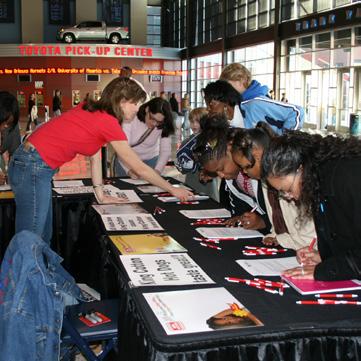



2011
Anfernee "Penny" Hardaway becomes a spokesperson for King's Rightly Seasoned


2011
Monogram Foods Invents Bacon Jerky
2012
Monogram Foods Loves Kids Foundation is founded
top managers in the food industry — Wes as president of Sara Lee Dinner Group, and Ches as vice-president/customer development for Conagra Foods in Tampa.
Monogram turned out to be the beneficiary of their collective expertise earned at two Fortune 500 companies. As Schledwitz put it: “They were both superstars in the making.”
Through the hard work and determination of Karl and Wes, Monogram was able to buy its first plant in Chandler, Minnesota, in 2006. It was a Sara Lee property that produced meat sticks. It employed 115 people, just 35 percent full. And although they were able to acquire it at a deep discount, it was losing money. Fortunately, the turnaround did not take long. “We turned a losing proposition into a break-even proposition
fairly quickly,” Jackson says. And that turnaround continued; today the plant employs more than 400 people in a town with a population of 250. “We developed our strategy to become a comanufacturer and a private label provider, and that model started with that first manufacturing facility we bought,” says Jackson. A strategy that has sustained the company for 20 years. That plant set the stage for the company to continue to buy turnarounds — and it set the stage for profitability.
Monogram began making asset purchases from large corporations that wanted out. “Each was losing money and required us to go out and find new revenue in order to turn them around,” he says. “Our team was pretty good at going out and finding new business to fill up the capacity that those plants had. And as we continued on, we would make investments to add more capacity as we continued to bring on more cus-
tomers. And it turned out to be a pretty successful model.”
“It was 2007 when we first made any money,” Schledwitz says. “We were high fiving because we'd made $27,000.”
But then came 2008, a lousy year for the economy, and Schledwitz remembers it well. “It was devastating. Banks shut down and businesses were going out of business. You couldn't borrow money. Unemployment was high. It was a train wreck. We had just barely made a little bit of money and were scrambling. To stay alive, executives took 5 percent to 20 percent pay cuts. When we traveled, it was two to a room.”
But then, Schledwitz says, the company pulled off what one of its advisors said was the trifecta. “We bought and financed companies during this recessionary time,” he says. “And we were a company that hadn't been making any



2012
Opened Monogram Foods plant in Bristol, IN 2013
Opened Monogram Foods plant in Harlan, IA
▶ Continued
money and didn't have any history, but we cobbled together the financing.”
Between a poor economy and the vision that it needed to grow, Monogram’s adventures in acquisition were about to get interesting.
Here’s where the story becomes an adventure saga with twists and turns galore. It wasn’t a typical tale, but it vividly illustrates what entrepreneurs have to be ready to deal with when circumstances change and Plan A has to quickly become a Plan B. Or C.
“It was 2009 and we were buying this plant in Martinsville, Virginia, that was losing $100,000 a week, $5 million a year,” Schledwitz says. Monogram was planning to buy a brand called Wild Bill’s, which made beef jerky, and move it to Martinsville to help the plant’s
profitability. Financing was subject to Monogram having an acceptable “quality of earnings.” (It’s an accounting term that indicates how well a company’s reported earnings can predict future earnings.) The accountants said it would take four to six weeks, but 14 weeks later, Monogram was still waiting and they couldn’t close the loan he’d put together until they finished. “My contracts to buy all of these businesses were running out,” says Schledwitz.
It was a multi-million-dollar deal to bring together a product and a facility, and it was ready to go except that the delay by the accountants meant there still wasn’t proof of financing. Wild Bill’s agreed to a 10-day extension for a $100,000 non-refundable deposit. The quality of earnings report still wasn’t forthcoming, so Schledwitz asked for another ten days, and was ready to pay another $100,000. Instead, Wild Bill’s notified him at the end of the first ten-day extension that there would be
2015
Opened Monogram Foods plant in Plover, WI
Wondering how Monogram Foods got its name? Company founders Karl Schledwitz and Wes Jackson started the company by acquiring brands King Cotton and Circle B. They also acquired the Sara Lee ham business which was called “Monogram Hams.” Through Monogram Hams, customers could purchase personalized or “monogrammed” ham boxes that could be sent as gifts. Eventually, as the business expanded, that program was discontinued and the company was renamed Monogram Foods to better represent its expanded product offerings.
no more extensions and that he had to come up with $6 million — by the end of the day. Which was, in reality, about five hours. Why? “We changed our minds and we don’t want to sell,” they

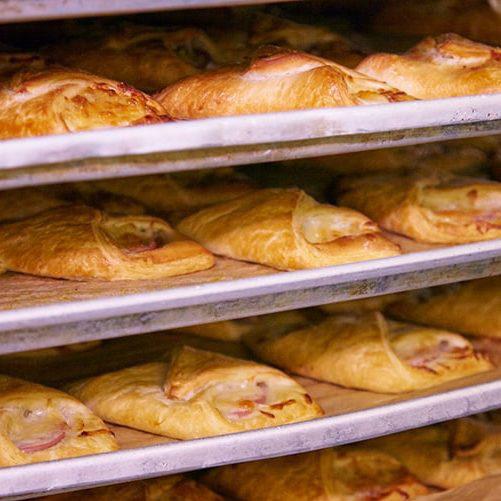
2016
Opened Monogram Foods plant in Wilmington, MA

told him. So all Schledwitz had to do now was come up with $6 million.
One of the significant conversations he had — with the clock still ticking — was with his wife, Gail, who was alarmed. “I put up everything,” he says. “Our house, a hundred percent of my stock. I pledged everything.”
It was a race down to the wire with a host of obstacles, and it shouldn’t have worked. But it worked.
“I got $6 million in five hours with a little help from my friends, including John Pontius and Pitt Hyde to whom I am forever grateful,” Schledwitz says.
2017
American Biogas Council Biogas Industry Awards Winner for Project of The Year for Martinsville Clean Caring Plant
2018
Opened USDA Bakery in Wilmington, MA facility
“They were our saviors.” So Monogram had the proof of financing -- they had landed Wild Bill’s!
This sounds like the end of a story, right? Not by a long shot.
The next thing was to contact the chief financial officer of the company that owned the Martinsville property, Rob Hovde, to finalize arrangements so Monogram could move the newly acquired Wild Bill’s jerky enterprise into the plant. “I’ve got the money put together,” a relieved Schledwitz told him. “I’m going to need just a bit more time.”
The response was not what Schledwitz wanted to hear. Hovde told him there was no more time to be had. “He told me ‘Pick up the Wall Street Journal, young man. We are in a depression.’ I told him I’d just borrowed $6 million, but he just said, ‘I'm sorry it didn't work out. Best of luck.’ And he hangs up the phone.”
Schledwitz, stunned, went home to his wife. “Gail, you know that $6 million we just borrowed to buy equipment to
make jerky? We have nowhere to move it and it won't fit in our garage.” Gail asked, “What are you going to do?” He pondered a bit and told her he was going to the selling company’s corporate headquarters. He told her he would get on his hands and knees and beg. “Well, if you’re going to do that,” she told him, “at least look good.” She then went to Home Depot and bought him the store’s best knee pads.
“The next morning, I flew to the headquarters. I'm in front of their offices in my coat and tie — and knee pads.” They wondered what was going on, but were curious enough to let Schledwitz into a conference room. He had his audience — the company’s owners and president. “I told them my story and said ‘I really can close this deal. Give me another 10 days.’”
And it worked. Finally, Wild Bill’s jerky had a home!


2018
National Provisioner named Monogram Foods “Processor Of The Year”
Continued
There is a postscript: Schledwitz later asked Hovde to join the Monogram board because he had helped his company grow so significantly. It certainly paid off: in 2012, Hovde helped get financing for acquisitions and then became a significant Monogram shareholder.
In 2011, Monogram had been in business seven years and Schledwitz had led three rounds of raising money. Monogram had about 80 shareholders then and they were getting anxious. “I had some who were long-term thinkers who want to see their money compounding and getting good returns. I had other shorter term investors on board. We raised all the money ourselves — we picked up every check, made every presentation. We never used a banker to

2019
Recognized for the 10th year on the Inc. 5000 fastest growing companies list
raise money and still haven’t.”
Still, some of the shareholders were wondering when they’d get their money back.
At this time, Schledwitz was heading to an Inc. 5000 conference aimed at entrepreneurs and small business leaders. He was to be a breakout speaker since Monogram was the third company he’d started that had made the Inc. 5000 list. He had a good entrepreneur-
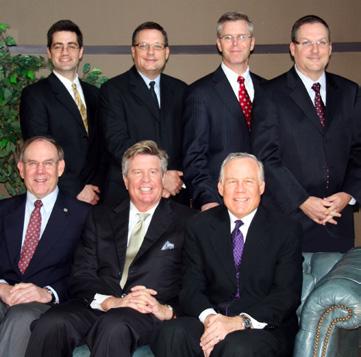
2021 Opened Monogram Foods Plant in Denison, IA
ial record, but like any visionary leader, he always wanted to know more. One of the headline speakers was a founder of Zappos, who had sold the company to Amazon for about $1.2 billion. And he had some words of wisdom that Schledwitz heard loud and clear.
“He said that Zappos was the second company he started,” Schledwitz says. “What he learned between the first and second was that in his first company, he didn't have shareholder alignment. He said some shareholders were longterm, some mid-term, and they didn't have the same vision. I'm thinking, ‘That's me, that's us!’ So we hired a facilitator to come in and we created our own mission and vision, so the shareholders and other stakeholders had a “North Star.” Monogram’s mission – set forth then and still today - is to “deliver continuous profitable growth for their customers, team members, suppliers,




2021
Monogram Foods surpasses $1 billion in revenue
2021
Opened Monogram Foods Plant in Dickson, TN
2022
Monogram Foods Loves Kids Foundation raises over $15 million
Continued
and owners through partnership and innovation.” Its vision is to be “the growth partner that makes it better.”
One of the cornerstones of this evolution was that all of senior management agreed to read Jim Collins’ book Good to Great. “There’s a chapter in the book that says all great companies need a BHAG -- a Big, Hairy, Audacious Goal,” Schledwitz says.
This is where another acronym comes in to play. EBITDA stands for earnings before interest, taxes, depreciation, and amortization. It’s a method of assessing a company’s profitability and Schledwitz saw it as a way to formulate not just a goal, but a BHAG.
In other words, it was time to put pedal to the metal. Monogram had about $7 million in EBITDA and the company’s management decided to up that to a $60 million EBITDA goal in six years. “Sixty in Six” was definitely auda-
cious. But could they pull it off?
Schledwitz addressed a shareholder’s meeting and told them, “The only way we can do it is continuing our game plan of buying other people's problems and turning them around. Acquisition. If you want to stay in, you're going to have to invest more or be diluted. So if anybody wants out, let me know.”
Three shareholders wanted out and Schledwitz found someone to buy them out. Everyone else bought into it, and now he had achieved that essential shareholder alignment.
It had certainly become something of a crusade and was part of every share holder meeting. The next year, Monogram bought a corn dog plant, and then a second corn dog plant, and merged them. The next year they purchased a pre-cooked bacon plant. “The owner of that plant, Scott Carlson, joined our board,” says Schledwitz.
Continued





2022
Opened Monogram Foods Plant in Medford, MA
▶ Continued
The growth continued.
In 2014, Monogram expanded the Martinsville plant, and the next year it acquired two plants in Wisconsin out of bankruptcy.
In 2016 Monogram acquired a facility in Boston. “One of the reasons we bought that was my partner, Wes Jackson, loved the fact that they were doing business with one of the largest and most admired food retailers in the world. Fast forward to today, that retailer is our biggest customer.”
So the Sixty in Six plan was unfolding, always with the vision of being that growth partner. “I told the company's shareholders that our goal was to hit the Sixty in Six EBITDA goal by the end of six years, which would've been the end of 2018,” Schledwitz says. “Back then I used to say, we might get there a year earlier, get there a year late. The reality is, we didn't get there until 2020, but nevertheless, we did it.”
2023
Opened Monogram Foods Plant and Warehouse in Haverhill, MA
2024
Monogram Foods
Celebrates 20 Years of Growth and Giving Back
One person who has been with the company since the beginning is Kathy Howell, the Director of Business Development in the company’s bacon division. “We really do try to spend time looking in the rear-view mirror and remembering the company that started here 20 years ago, four offices ago — about to be five — so that when we look ourselves in the mirror, we're better and stronger for having overcome the adversity.”
Howell says another thing that was cooking from the very start was Monogram’s commitment to its communities. Howell remembers having lunch in the office with Schledwitz in the early days of the company. “He said to me, ‘Kathy, one day we'll be solid enough and profitable enough that we'll be able to start some kind of a foundation. I don't know what kind of thing we're going to do, but I want it to be about lifting up kids and supporting kids in a community because the children are always the
future. And when we get to the point where we're making it, I want to be able to give back.’”
The Monogram Foods Loves Kids Foundation is what ultimately became of that. It provides direct funding for initiatives in every community in which the company operates. Today, the Foundation has a $10 million endowment and aims to raise $1 million a year. That’s just one benchmark of what Monogram Foods has striven to do. With a vision of growth and a devotion to all who work for and with the company, it plans to continue on that path of success.
“The secret to our success is that our people are just so good and committed and they want to do a good job, and hats off to our leadership,” Howell says. “When you've got a bunch of people that want to do good, you've got to lead 'em in the right direction. And by God, they'll just run through that brick wall for you.” �
Total Number of Team Members
3,907
Total Square Footage
687,400


Wilmington, Massachusetts
USDA Bakery & Sandwich Assembly
Number of Team Members
341 Square Footage
88,000
Medford, Massachusetts
USDA Bakery
Number of Team Members
88 Square Footage
64,000
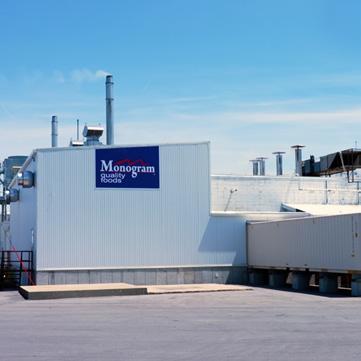
Denison, Iowa Sliced Bacon
Number of Team Members
370 Square Footage
104,500

Haverhill, Massachusetts
Sandwich Assembly
Number of Team Members
385 Square Footage
145,000


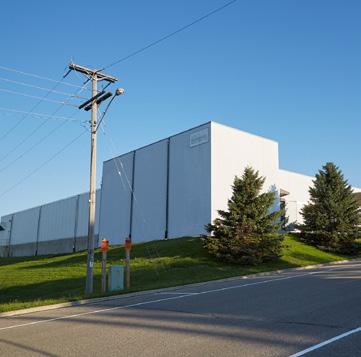
Harlan, Iowa
Pre-cooked Bacon
Number of Team Members
345 Square Footage
50,000

Plover, Wisconsin
Frozen Appetizers
Number of Team Members
440 Square Footage
237,000
Martinsville, Virginia
Jerky, Meat Sticks, & Portable Snacks
Number of Team Members
808 Square Footage
160,000

Bristol, Indiana Corn Dogs
Number of Team Members
450 Square Footage
160,000
Chandler, Minnesota Meat Sticks & Refrigerated Sausage
Number of Team Members
470 Square Footage
141,300

Memphis, Tennessee Support Center
Number of Team Members
210 Square Footage
40,500
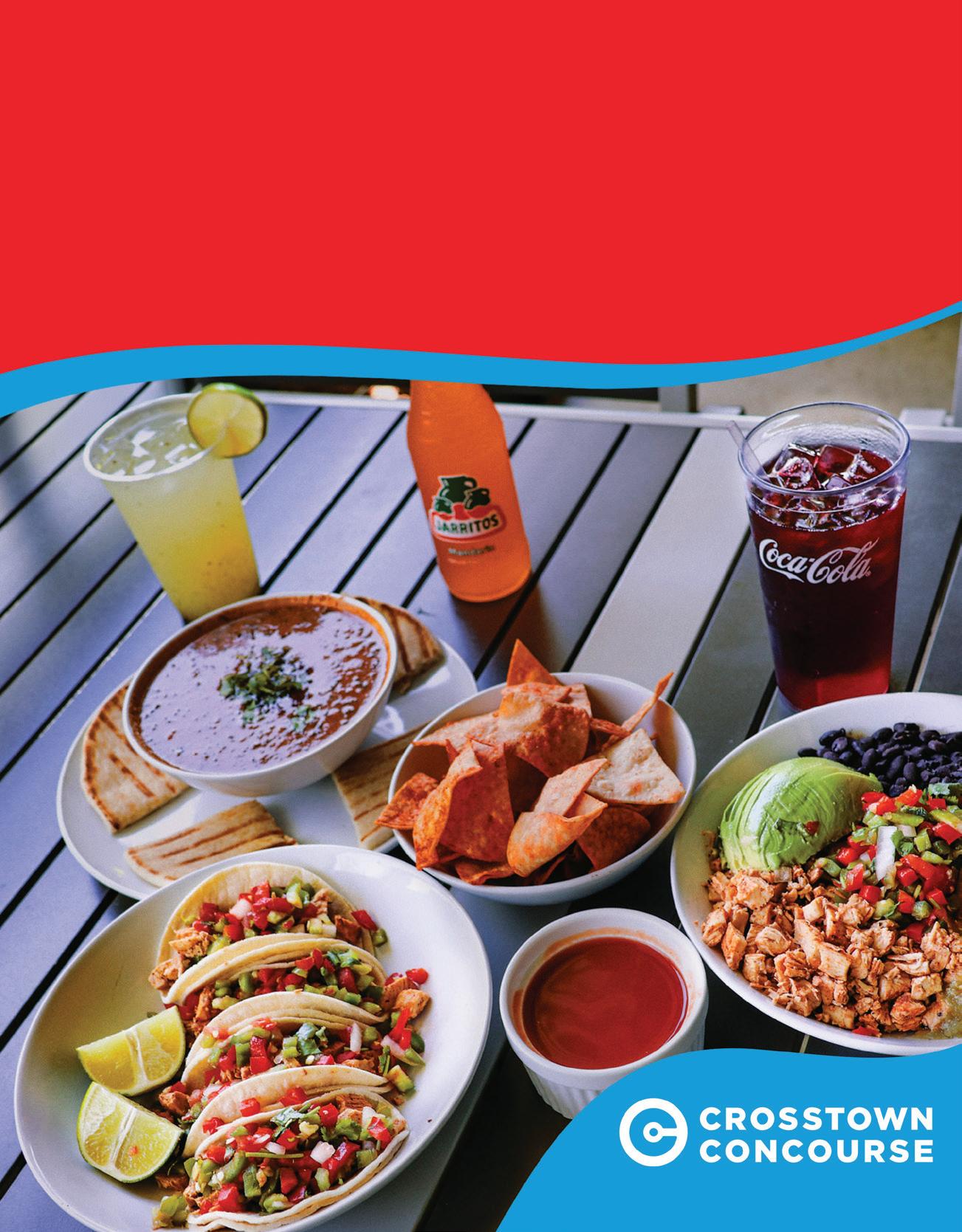


In evaluating investment opportunities, Pritzker Private Capital (PPC) keeps family top of mind. “We focus on partnering with family- and founderowned businesses,” explains Chris Trick, a partner at PPC who focuses on food and beverage investments. “We want to build great businesses, and the best way to do that is by having a management team that really cares about its legacy and treats its employees, customers, and suppliers that way. Families and founders care about what happens to their company.”
PPC first met Monogram CEO Karl Schledwitz at a conference in 2019 in California. The parties recognized commonality in mission and a relationship was born. “Karl is a well-connected person,” notes Trick, “and he talked to other investors. We were impressed by the business he built and fortunate he chose to partner with us. We found each other.”
Trick identifies several qualities that made Monogram Foods the kind of company that fits PPC’s long-term goals. “It’s an entrepreneurial organization,” he says. “They had thoughtfully built their business with a customer-first focus and a lot of pride around food safety. When you’re manufacturing for other brands, you have to be a safe set of hands from a production standpoint.
Additionally, it’s an innovative culture, trying to bring more value to their customers. Karl has an infectious personality and has surrounded himself with a lot of very talented people.”
The partnership is more than financial. PPC’s human capital aims to fuel growth on multiple levels. “A lot of our involvement is at the board level,” explains Trick. “Helping with strategy, governance, large projects, and significant investments. But we also bring operational resources to the table. For example, we can help with the design of a new facility, either with talent we have or via third parties we trust and respect. Building a new production line doesn’t happen overnight. We get involved tactically.”
A hockey player during his college days at Notre Dame, Trick appreciates team goals over individual, and sees further growth for Monogram Foods as its partnership with PPC carves new paths. “When we first invested, a lot of growth was baked in,” says Trick. “Our expectation was to double the size of the business, or more. That’s going well so far. We’ve added multiple facilities. We’ve upgraded equipment. It’s thoughtful growth and we now have the capacity to support a much larger organization. It’s a remarkable story considering where they started in 2004. It’s a huge testament to Karl, Wes, and the team; they are vision-
ary leaders. They took some risks that others probably wouldn’t have taken, and they’ve been rewarded for that.”
Twenty years are in the books, but what about the next two decades for Monogram Foods? How might success for the company be measured in 2044? “There’s been a trend toward outsourcing manufacturing to trusted suppliers,” says Trick. “That’s going to continue. Monogram has a lot of opportunities in front of it: we’re under-indexed in food service, and there are opportunities to expand our offering with tangential products that would give us additional growth avenues. So if we’re sitting together 20 years from now, we’re doing more with private label, more with food service, and we will have added additional production capabilities that make us even more prominent in the marketplace.
“A lot of the heavy lifting was in the early days,” adds Trick. “There’s ample good news for the future of this business if we continue to do our job. It’s making the important and right decisions, day to day, so we can even have that conversation 20 years from now. Invest in the facilities. Invest in the people to build the bench strength of talent. We’re focused on doing that every day.”

▶ Continued
PPC is not the only prominent investor supporting the company, and its coinvestor has deep Tennessee roots.
Based in Knoxville, HF Capital invests on behalf of the Haslam family. The patriarch, James A. Haslam II, founded Pilot Corporation in 1958. “As an entrepreneurial family, they want to own businesses,” explains Andrew Seamons, chief investment officer with the firm since 2020. “They will invest in other asset classes: public stocks, fixed income. But they want to own companies. We have a team that does nothing but buy into companies. And they want to own things they can understand, things they can touch and feel, and be profitable.”
Seamons, individually, has sat on the Monogram Foods board since day one, initially representing another investor. As a result he has witnessed the profound growth, not to mention the decisions among leadership and management that spur that growth. “When Pritzker Private Capital was going to invest in
the company,” explains Seamons, “it was an opportunity for us to be part of that partnership. We like to partner with other family offices, other sophisticated investors. PPC’s team and experience are a great benefit to the company.”
Monogram’s board is relatively small, but it gathers regularly with intentionality and a shared sense of mission led by CEO Karl Schledwitz. “We’ve had many discussions about acquisitions,” notes Seamons, “around things the company might want to buy. Discussions about the plant network we have, and where we need to add capacity. Discussions about capital expenditures, and where we want to use our scarce resources to expand. It’s been an active relationship.”
HF Capital has enjoyed Monogram management’s steady leadership. “One of the things Karl excels at is communication,” he says. “He brings the board members up to speed [on developments] long before there’s a vote. He’s not someone who will enter a meeting and try to ram something through. It’s a collaborative board. The discussion is about what we can improve: where are the problems, and
how do we solve them?”
Having surpassed $1 billion in revenue in 2021, Monogram Foods is a success story, but still a relatively young one. Seamons sees new ventures ahead, and with wind in the sails. “They’ve been on a nice growth trajectory from the beginning,” he says. “We are working hard to double revenue in a few years. That would be from a combination of filling the plants that we own and continuing to build, either by adding to capacity or building more plants. We are food manufacturers with a specialty in proteins. There are lots of things out there that might fit.”
What might we see on a 30th anniversary, or a 50th? “Monogram will be one of the leading private-label food-manufacturing companies in the country,” says Seamons. “Private-label is becoming more and more important for retailers, especially around protein products. Many large companies want to be more brand-conscious, and less of a manufacturer. They want to be a ‘capital-lite’ owner of brands. We play an important partnership role with them, in actually making the products they want to sell.” �

The Corn Dog Capital of the World is Bristol, Indiana, where Monogram Foods produces one million corn dogs a day, and another 3.8 million mini corn dogs. “We were the ones that made it the capital,” says Karl Schledwitz, chairman and CEO of Monogram Foods. “We kept growing so much there that we declared the city the Corn Dog Capital of the World.”
In September, the city hosted its third annual Corn Dog Festival, bringing people together for entertainment, live music, games, and, well, corn dogs, including a mini corn dog-eating contest. The day benefited The Hub: Hearts United for Bristol, the community’s food pantry and resource center.
“It has really grown every year,” Schledwitz says. “It’s the biggest thing that happens in Bristol, Indiana, every year. I take a group from Memphis to go show support. It’s a lot of fun.”
It’s also a point of pride, Schledwitz says, that the festival is sponsored by the Monogram Foods Loves Kids Foundation, Monogram’s charitable fund that supports children's initiatives in every community in which it operates. “It’s just trying to raise our awareness in the community, make people proud to work at Monogram, and try to lead by example,” he says.
The Monogram Foods Loves Kids Foundation was founded in 2012, only eight years into the company’s still relatively young existence. “It’s just a testament to our leadership and to our people,” says Liz McKee, director of corporate communications, of the Foundation’s early start. “There’s just
a real heart for service and for helping others. We are a giving company and our employees take a lot of pride in that.”
“We wanted to figure out a way to give back to the communities and be good stewards to the communities,” Schledwitz says. “We think our culture is one of our distinguishing factors as a company, but our first behavior that we talk about is people first, team always. And then one of the others is giving back to the communities where we live and work.”
Knowing this, leaders at Monogram narrowed their charitable focus to children’s issues. “We’re committed to supporting future generations so that our people and communities continue to thrive,” says McKee. “Taking care of the most vulnerable in our communities and our society really does impact the future.”
Through the Foundation, each year a group of team members at each facility goes through applications to select the organizations to impact with grants, totaling a minimum of $60,000 per community, or $660,000 total. “We wanted to put this in the hands of our team members because they’re the ones that are in their communities,” McKee says. “They understand what the community’s needs are.”
In 2024, through this annual grants cycle, the Foundation donated $660,000 to 126 nonprofits in seven states, the largest number of grants it has ever awarded. It has also contributed more than $330,000 in additional charitable contributions and $80,000







is a proud supporter of



▶ Continued
to local food banks in honor of its 20th anniversary. So in total, they’ve given well over $1 million this year.
A bulk of the donations come from the foundation’s annual fundraiser, the ‘Meat’ Me in Memphis Gala, which coincides with Monogram’s annual suppliers conference. This year marked the 14th year. The event was held Thursday, October 24th, with a goal of raising $1 million, which Schledwitz says they exceeded.
Each year, there’s a silent and live auction, and the University of Memphis’ Sound Fuzion performs. “This is their biggest show that they put on every year, and we make a donation to the University of Memphis School of Music. And then we have up to a dozen of Memphis's top chefs donate their time and prepare small plates for the event. We also make a donation to the chef's favorite charity here in Memphis. Each chef prepares two items, and some elect to use an ingredient that Monogram makes, whether it be smoked sausage or bacon or cheese curds or corn dogs.”
In addition to the gala, employees also support the foundation through a payroll giving program. Last year, employees gave more than $60,000. And Schledwitz says, “Three years ago when we did a transaction and our investors were able to cash in some or all of their stock, a lot of people made a lot of money, and we asked our investors to give back a little of that.” That’s the year the foundation hit the $16 million mark. Today it has a $10 million endowment with plans to raise $1 million per year. With all of this support, McKee says, “We’re able to help families that may be on the brink of poverty or don't have access to warm meals or clothing, or who need assistance with physical and mental health, so we’re able to make a very broad impact.”
Some of this year’s Memphis grantees include Meritan, which is collecting supplies to set up homes for teen girls
aging out of foster care; JIFF, which provides young children mental health resources through its Early Intervention Program; ARISE2Read, whose mentors help guide at-risk children and also ensure they are at their grade’s reading level; and CodeCrew, which expands its after-school computer science program for students transitioning from middle school to high school.
McKee and Schledwitz both recognize that the Foundation wouldn’t work without Monogram’s employees and their support, whether it’s their payroll giving, their participation on the selection committees, their volunteering at the gala, or taking pride in Monogram’s name at the larger-impact community projects, like the Monogram Foods Loves Kids Splash Pad at the Memphis Zoo or the Monogram Foods Smith River Sports Complex in the Martinsville, Virginia community.
With that and with Monogram’s commitment to serving others, the company started its own employee assistance fund called MonogramCares this year to help employees in need. MonogramCares offers grants to employees who are facing an unexpected challenge in their lives, like an unexpected death in the family, an illness, or a house fire, to name a few examples. “We have been supporting our employees for as long as we've been in existence,” says McKee. “That’s just the kind of company we are. And this year, so that we can really impact more employees, we wanted to formalize the program so that employees knew that it was available and it is also supported by our leadership. Not only are we helping people in the community, but also our own employees who may face unexpected tragedy or emergency,”
“We’re really proud of that,” adds Schledwitz.
“Our team members really are the heartbeat of Monogram Foods Loves Kids,” says McKee. We’re able to give back so much to our communities because our employees lead the efforts. It wouldn't exist without our employees.” �

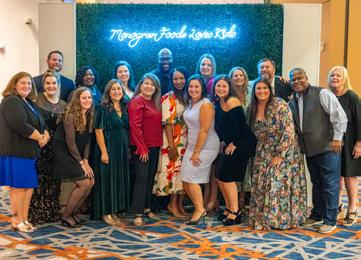

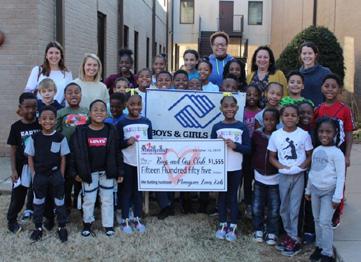


Pitt Hyde

“20 years ago, Karl and Wes approached me about investing in their Memphis-based startup. It took me back to my startup days and I am so glad to have been their lead investor.
20 years later, we are still a major supporter of Monogram Foods and have had board representation for 20 years. Here’s to the next 20.”






Monogram Foods is pleased and proud of the many different brands that comprise our business. Each brand's logo is featured here.




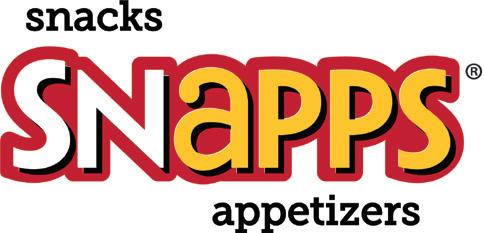

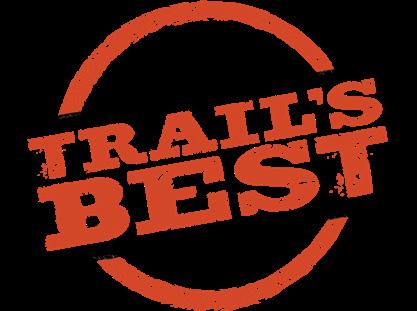

Ana Rodriguez is understandably proud of her title at Monogram Foods. She’s the chief people officer (a role often referred to as chief HR officer) and the way she sees it, that choice of words is indicative of the company’s working culture. “I think the company was a little bit ahead of its time by using that title, chief people officer,” says Rodriguez. You see it a lot more now, but Monogram Foods was using it from the beginning, and I think that was very intentional on behalf of Karl [Schledwitz, company CEO and co-founder], to make it clear that we do put people first. He's a really strong believer in that.”
Being a Memphis-born company has a lot to do with that very humancentered approach. “Karl is a native Memphian,” says Rodriguez. “He's been here all his life, and I think his goal was always to create something sustainable here that really reflects his hometown. We value diversity in the organization, and I do think it reflects Memphis.”
That personable way of doing business led co-founders Schledwitz and Wes Jackson to cultivate what the company calls a “People First” environment. Rodriguez describes it as “a culture of celebrating success, being very open, and having a very entrepreneurial mindset. But always putting people first.”
Although the ethos grew out of
Ana Rodriguez Chief People Officer

Memphis, it’s spread across the country as Monogram has seen tremendous growth over the past two decades; today Monogram employs almost 4,000 team members in 13 locations from Massachusetts to Iowa, Minnesota to Memphis, and beyond. And all across the map are stories evoking a deeplyheld sense of community.
As Rodriguez puts it, if a company fosters a culture of mutual support, it builds its own momentum. “Once you embed that into an organization, what you start to see is people taking care of each other,” she says. “When I visit the plants, I'm always amazed at what I see at literally every plant I've been to. On the day I arrive, they will be doing a bake sale, or they're selling tacos, or they're selling sandwiches, or they're
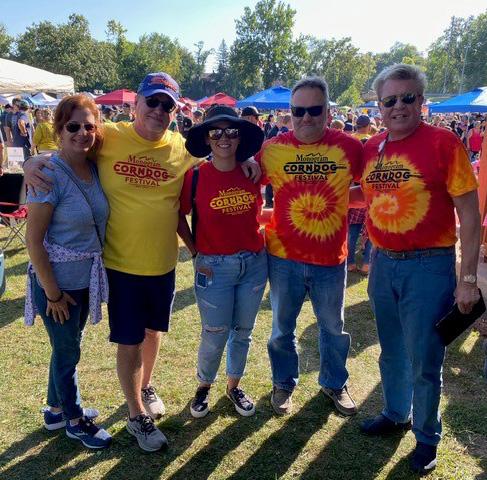
selling treats — all to help one of their peers. Maybe somebody's family member passed away, or somebody's dealing with an illness, and they are there to help each other. They show a lot of care and concern for each other.”
Monogram Foods recently formalized that care and concern in a program called MonogramCares, a non-profit that offers grants to its employees when they face unexpected emergencies.
“Something like an apartment fire or a chronically ill child can have a devastating impact on a family,” says Rodriguez.
“It is our hope that these grants make things a little easier for our team members in their greatest times of need.”
The Monogram team also shows up in



Congratulations to Monogram Foods on their 20th Year Anniver sar y
We’re honored to suppor t their Mono gram Foods Loves Kids mission.


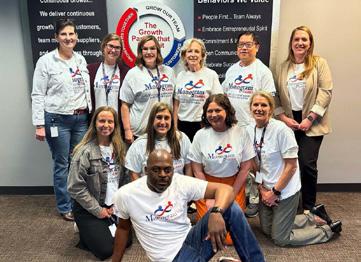

Kathy Mullins Howell Employee #1
▶ Continued
a big way when it comes to community support. One notable example of this is the annual Corn Dog Festival in Bristol, Indiana, where Monogram produces millions of corn dogs each day. “Bristol is the “Corn Dog Capital of the World,” and they own it,” says Rodriguez. “The whole plant got together and came up with this idea for a festival with proceeds going to help the local food bank. And that's been terrific for team building, if you can imagine, because the plant employees are the ones that plan it, coordinate it, and work the entire festival. Our team members do that all together.”
Bristol held its third and final festival in 2024, but the plant plans to look for another way to continue to come together to make a big impact on the community.
Rodriguez also notes that building the future of Monogram means making sure the company nurtures the talent within. “We're a 20-year-old company, which is very young in the corporate world,” Rodriguez says, “And we need to be thinking about who’s going to be the next set of leaders in the company, not just this year or next year, but 10 years from now. You need to start identifying those people and developing them, making sure that people today who are working for us have the skills that they need to be successful.”
Employees can also take classes online via LinkedIn and other platforms in order to develop their leadership and other skills. “We want to be viewed as a learning, agile organization where we’re constantly getting better, developing
our talent, making sure that people are upskilling constantly,” Rodriguez says. “And then the other thing that we’ve really focused on is what I call the employee value proposition. We know what we get when people come to work for us, but do they understand what they get? We believe that we have a really amazing culture, and so we want people to value that.”
Monogram has received accolades and awards for being an employer of choice, but the biggest testament to the company’s culture and commitment to its people are the people themselves. With nearly 150 employees who have been with the company for two decades as members of the “20 year club.” One such member, Kathy Mullins Howell, also known as “Employee #1” has been with the company since it all began. “Monogram has shaped me, as much as I have shaped it over the last 20 years,” she says. “The peaks and valleys have made us stronger and better. Our culture remains central to what drives us everyday. We care about each other, our products, and our results.”
It seems Monogram has found the recipe for success – choose the right people and treat them well. “You sometimes hear people say, ‘Employees are our biggest asset,’” Rodriguez says. “The truth is, no company can run without employees, right? We’re not going to make any products without our employees. Our employees are not the biggest asset; they are the most important thing at our company. And so treating that as a business issue is really important. We put people first.” �









Data Facts delivers unmatched background screening expertise, with personalized support you can depend on. Our foundation is built on technology-driven information for people, about people, by people. We employ highly trained sta to assist you with every need, and o er live chat on our website supported by real team members. Choose the partner who puts your needs first by o ering a dedicated approach to serving their clients...because you deserve a better experience.








Nika Martin Director of Culture and Inclusion

When you ask a Monogram Foods team member about the company’s core values, they will likely respond with the words, “People first, team always.” And according to Nika Martin, director of culture and inclusion, “It is core to who we are, but to me, the most important part is the rest of that value statement: valuing each other through relationships, diversity, equity, safety, and respect for differences.” That statement is what drew her to the role in 2021 when she became Monogram’s first director of culture and inclusion. “When I did my research on Monogram Foods before joining, I saw the company as one that understood diversity, equity, and inclusion (DEI) has to be a part of the overall business strategy and organizational culture,” says Martin. “This work can’t be siloed. DEI should be part of the company’s DNA to be impactful and I believed Monogram Foods saw that as a goal. And now that I have been here for three years, I see our progress as an indication of that focus.”
Martin added, “If an organization is going to truly embrace DEI, it requires a mindset of openness and a genuine commitment to this important work. We see our culture as our secret ingredient and a key factor in our growth.”
In the years since she’s started, Monogram established the Monogram Inclusion Council (MIC), which consisted of diverse team members from across the company. Based on their work and advisement, MIC has since given way to two employee resource groups (or ERGs), Monogram BIG (Black Inclusion Group), and Monogram WAVE (Women Achieving Vision and Empowerment). They have three goals, Martin says: to connect and network with team members across the organization, develop personally and professionally, and make an impact in the community. There are plans for additional ERGs in the future.
“ERGs are open to all team members,” says Martin, “Men have joined WAVE seeking to better understand the
unique challenges women may face in the workplace and how to be effective allies. Black Inclusion Group members, from diverse backgrounds, join looking to learn and develop their leadership skills to be better advocates for equity and inclusion.”
Another point of pride for Martin has been the company’s introduction of Table Talks, where team members can learn and receive resources about a variety of topics from inclusive language to mental health. “We have a very diverse workforce,” Martin says. “It’s an opportunity not only to showcase our organizational culture, but also to provide a platform for team members to be recognized and celebrated. And, as an educational tool, it serves as one of many touchpoints designed to provide a positive team member experience for our workforce.”
The company has implemented comprehensive training programs for all people leaders, ensuring that they


















































Continued
have the knowledge and skills to create a welcoming and inclusive workplace. "The leadership training has had a significant impact on our leaders' approach to inclusion," says Martin. "As a team we have become more proactive and intentional in our efforts. For example, the communications team plans for observance months well in advance and ensures that messaging is inclusive and imagery represents our workforce. Similarly, our human resources teams and company leaders are including demographics when working on succession planning and talent management. Our leaders have embraced these principles and are actively doing their part while understanding there is still work to do.”
“I am most proud of the fact that DEI is more and more becoming part of the critical processes of the company and we are seeing the outcomes,” Martin continues. “An example is the increase
in women in the C-suite. When I came in, there were two women in the Csuite. Now there are five, and that’s in less than three years.”
Those women leaders are Beverly Gates, chief legal officer; Jana Haynes, chief financial officer; Dawn Drewry, chief information officer; Ana Rodriguez, chief people officer; and as of September 2024, Jess Reese, senior vice president of sales and business development.
Speaking on this, Rodriguez says, “We are one of the very rare companies in corporate America that actually has an executive team that’s 50-percent women. I’ve been in a lot of different companies, bigger and smaller, and that is a very unusual ratio. This is a really nice evolution, and I have to give our CEO Karl Schledwitz a lot of credit for that because he’s got such an open mind, and he is truly always looking for the best talent.”
As chief people officer, Rodriguez knows that building the future of Monogram means continuing the
strong commitment to diversity and that it is more than lip service. “Diversity, equity, and inclusion is not a box we check, it is a cornerstone of our business strategy. The research has proven that more diverse teams perform better overall,” says Rodriguez.
CEO Karl Schledwitz echoes these sentiments and says this is not a fad. “Embracing diversity and ensuring all team members feel part of Monogram is not something that goes out of style. It is part of who we are and we remain committed to the pathway to get us there.”
Martin agrees that DEI is not only the right thing to do, but it is a business imperative. “When team members experience inclusion, they contribute more fully to the company's success,” Martin adds. “Team members are more productive; they do better work; they have better attendance. All these things come together. It’s just another way to support our team members, and by doing so, we support our customers, as well.” �
Looking back at 20 years of building Monogram Foods, Karl Schledwitz sums up the company’s progress. “Wes Jackson and I started in 2004 with five people in a tiny office,” he says. “Fast forward two decades and Monogram now has almost 4000 team members in 13 locations. It's been a bumpy ride at times, but a great journey.”
20 years of strategic planning blended with considerable risk-taking yielded some great results for the company. “We’ve experienced a more than 28 percent compounded growth rate over a 20-year period, which is pretty phenomenal. Fortunately, our bottomline numbers have had a 32 percent compounded growth rate as well, so we are proud of it.” And while the bottom line is what sustains a business, it is not the thing Karl is most proud of. “What we are proud of is that we've done it the right way,” Schledwitz says. “We've given back to the communities where we live and work, we embrace diversity, we've got behaviors we value, we try to do things with commitment and integrity, and our number one behavior is People First — Team Always.”
Co-Founder and President Wes Jackson echoes Monogram’s commitment to continued growth: “We would like to continue to see more acquisitions, and maybe double again in size over the next five to ten years.”
He points out that growth will bring opportunities for not only Memphis, but for plants that are now in six states. “In 20 years, I'd like to say we have operating facilities maybe in 15 states, and we have 10,000 employees and we're creating good jobs for good people and good growth opportunities and continue to support the communities that we work in,” says Jackson. “Monogram would continue to be a vibrant company that values culture, values people, creates jobs, and has great benefits. As we develop talent — and if we stay true to our mission and value our culture — I think that can continue well beyond 20 years.”
The past — and the commitment to growth — is a blueprint for the future.
“Sometime next year, we hope to have my successor in place,” Schledwitz says. “I will move to chairman of the board and will still be involved, but there'll be somebody else managing the day-to-day and strategy.”
He’s been interviewing candidates, and they've asked him the tried-andtrue question about what he hopes happens in the next five to 10 years. “My hopes for the future are that we maintain the legacy that we built and we do it maintaining our entrepreneurial spirit that we started with 20 years ago, and that we continue to be revered as a great company to work for. And I hope in the next 20 years and beyond, things
only get better.” Regarding that bottom line Schledwitz adds: “I also tell them that I'm keeping my stock. I believe in the future of this company. I know we will continue to be profitable.”
He cites Monogram’s vision statement: “The growth partner that makes it better.” He says that it’s a simple statement but it’s not just about making the food better. “We want to make it better for the communities we live in, for the team members that work for us, and make it better for the customers.” He adds that there are two other essential words in the vision statement: growth and partner because they indicate the work they do is not solely transactional, it is relational.
“Growth is also in our mission statement — profitable growth that will grow our team, grow our customers, grow profits together. We partner with our customers, we partner with our suppliers, we partner with our communities, and partner with our team members.” These ideals are on posters in every Monogram plant and around the company’s support center. “But these are not just words on a piece of paper,” he says. They guide how we operate each and every day.”
The future is, of course, the great unknown. But planning and preparation are key to being able to deal with what lies ahead. As Jackson says, “I like to say
that we have the ability to see around corners, but I don't know that we can see around two or three corners. I can't predict what AI is going to do, but I know it's going to change our world.” He notes that technology affects Monogram in every aspect, whether equipment, processes, or automation. “I don't know that we'll be the trendsetter,” he says, “But we'll certainly be a fast follower in investing in technology and staying ahead. Our model — since we're a private-label manufacturer and we manufacture for other companies — is that we have to continue to invest to make sure that we're a lowcost producer.”
One person who has been a key player in Monogram from the start is Leonard Kaye, a longtime board member with the company who has been crucial to the company’s growth. In 2004 Kaye was a division president at Malone & Hyde, Inc., the grocery company that would eventually spin off what is today known as AutoZone, so Schledwitz sought him out as a consultant. Kaye liked what he heard and says, “I gave Karl the first check in starting the company.” Kaye joined the board and he’s been a guiding force ever since.
As for the future, Kaye sees good things. “They'll continue to be a growth company and expand with Pritzker Private Capital,” he says. In August, 2021, Pritzker Private Capital (PPC) acquired a significant stake in Monogram Foods. It was a significant move, Kaye says: “PPC can help Monogram grow faster and get the great benefit of getting additional expertise from them.”
If Kaye has been with Monogram from the get-go, Jana Haynes is a relative newcomer. The company’s chief financial officer has been on the job for less than three years and is integral to the future of Monogram with her work developing strategic business planning. “We will continue to grow organically by focusing on the growing importance of private label product offerings in the food space,” says Haynes.“We also have experienced leaders with great connections throughout the food industry who have developed strong co-manufacturing relationships with many of the large,
branded food companies, and we will continue partnering with those organizations to support their innovation platforms allowing us both to grow together. Over the longer term, we will also likely supplement that organic growth with well-positioned acquisitions that allow us to expand our private label offerings while staying within our current areas of food manufacturing expertise.”
Haynes says the company is securing the future by utilizing space and capacity that has been created by past investments. “We've made very large capital investments in many of our facilities,” Haynes says. The investments range from expanding production space to installing new and innovative machines and processes. “We're looking at the right kinds of businesses that compliment what we can do today so that we can continue to grow the businesses we have, and serve new customers with the same high level of service our partners have come to know and expect from Monogram.”
As a planner with a keen eye on what’s to come, and as someone who knows the industry inside and out, Haynes says Monogram is in a strong position. “We have really brought in some amazing talent and the leadership here is deeply committed to building out processes and capabilities to ensure we are positioned to excel for the next twenty years and beyond. We're really set for great success in the future. We’re very proud of the ways that we are engaging with our communities in all of our locations, including here in Memphis.”
That commitment to Memphis is reinforced by the company’s upcoming move of its support center (or headquarters) to Crosstown Concourse.
Its present corporate site in an office building next to Oak Court Mall isn’t up to the expected expansion the company will need. “We’ve grown so rapidly that we now have almost 200 people spread across four floors of a four-story building,” Jackson says. “We’ve got people spread out, but our culture of collabora-
tion is very important to us. And then Crosstown is also very viable, vibrant — it feels like a community more than just an office building. We're very dedicated to Memphis and giving back and we just felt like being in that community.”
Schledwitz said he was looking for a “unicorn of a space” and Crosstown was it. “We wanted to get everyone on one or two floors so we could be contiguous and collaborative,” he says.
“We're leasing 55,000 square feet at Crosstown,” he says, “and you can literally walk around the entire office. Everybody will be using the same kitchen, the same copiers, and will be seeing each other to be much more collaborative. We also love the energy and diversity of that building — it's a little urban village. We’ll have corporate apartments there where people coming in to see us stay, and there are great restaurants. There's so much diversity and it's got a youthfulness to it.”
Schledwitz cites another key reason for the move to Crosstown. “I told my board that I believe it will help us attract our workforce. We are recruiting from out of town a lot, and I've been using Crosstown for months now, taking people over there for lunch, and it helps us. It’s a wise investment in our future.”
With that kind of commitment to Memphis combined with a commitment to expanding its manufacturing footprint across the country, and a deep and abiding commitment to its people and communities, the future looks bright for Monogram Foods. �





